In an era of rapid globalisation and ongoing advances in healthcare, it is increasingly vital for pharmacy students to engage in diverse learning experiences to stay at the forefront of innovation and change. To empower its Bachelor of Pharmacy (Hons) students with firsthand international experience, IMU has introduced the Global Exposure Fund to fully or partially support the direct costs associated with Semester 6 elective posting or Semester 7 research projects conducted overseas. Hence, 15 BP121 students were separated into two groups and conducted their elective programme at the Fudan University-affiliated Huashan Hospital and Zhongshan Hospital in Shanghai, China.
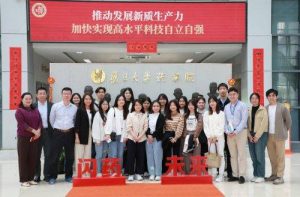
Fudan University-affiliated Huashan Hospital
Nephrology Department
In the main branch of Huashan Hospital, Christy and Kah Xin were assigned to the Nephrology Department at the main campus of Hua Shan Hospital. They had invaluable opportunities to participate in ward rounds with physicians, pharmacists, and nurses.
The patients ranged in all ages and disease states, from those in high dependency to those ready for discharge. After each ward round, the students observed how physicians and pharmacists discussed with each other to provide the best recommendations on the treatment plan. This exposure not only deepened the medication knowledge of the students but also strengthened their teamwork and clinical decision-making skills. They also learned some medication counseling tips from senior pharmacists.
Liver Transplantation Center
In addition, Jia Yi and Sin Yee were allowed to engage in the hospital’s real-world setting of a liver transplantation center. Their participation in the morning rounds with physicians, pharmacists, and nurses gives them insights into pre- and post-transplant protocols. They understand the necessary diagnostic procedures before surgery and post-surgery medication management, such as administering immunosuppressants, tailoring dosage adjustments, managing comorbidities, and medication counseling.
This experience enhances not only their knowledge of pharmaceutical care but also their understanding of the role of pharmacists in organ transplantation. Hui Xuen and Xin Yee also immersed themselves in the oncology department, participating in ward rounds and studying various cancer cases. They observed how oncologists assess patients, discuss treatment plans, and provide comprehensive care, learning the interdisciplinary approach essential for effective cancer treatment.
Neurology Department
Students Eunice and Christina were assigned to the Neurology Department at Huashan Hospital for their clinical rotations. The students observed and learned extensively about neurological disorders and their management. They engaged with patients suffering from conditions like stroke, epilepsy, and Parkinson’s disease, witnessing their diagnostic processes and treatments.
They worked closely with a multidisciplinary team, enhancing their understanding of medication therapy management, patient counseling, and the critical role of pharmacists in optimising neurological care. This experience enriched their clinical skills and deepened their appreciation for the complexities of neurological healthcare, preparing them for future roles as pharmacists in a clinical setting.
Infectious Disease Department
Students Yap Rou Xin and Aimee Ng Mei Li were assigned to the Infectious Disease Department at Huashan Hospital for their clinical rotations. During this period, they gained valuable insights into the fundamental operations of clinical rotations, starting from brief discussions among healthcare professionals, including doctors and pharmacists, to the actual clinical rounds where the leading physician interacted with and examined each patient.
The Infectious Disease Department was notably more chaotic than other departments due to the high incidence of bacterial and yeast infections. The students observed an unexpectedly high number of bacterial and yeast meningitis cases. Additionally, some infections were attributed to improper dietary practices involving unusual foods, underscoring the importance of public education on safe eating habits to prevent infections. From this experience, the students witnessed different types of infections and deepened their understanding of each clinical case and the medications used in each patient.
Outpatient Pharmacy Department
During the second week of placement, all the students were exposed to different departments in the west branch of Huashan Hospital. They witnessed firsthand how technology has revolutionised the healthcare sector in outpatient pharmacy.
The prevalence of automated medication dispensing machines in the Outpatient Pharmacy Department was particularly striking, highlighting the significant advancements in healthcare infrastructure. The machines automatically dispense drugs based on prescriptions, organising them in baskets for healthcare practitioners to review. These technological innovations not only lessen the workload for clinical pharmacists but also decrease the risk of human error and improve the efficiency of the dispensing process, ultimately enhancing patient care.
Pharmacy Intravenous Admixture Services Department
They also visited the PIVAS (Pharmacy Intravenous Admixture Services) Department, which plays a crucial role in preparing and managing all intravenous (IV) medications, ensuring they are compounded in a sterile environment to prevent contamination. This is a significant step towards enhancing patient safety and efficiency in hospitals.
The department employs automated dispensing machines to minimise medication errors by storing and dispensing medications as needed. Pharmacists then place the correct quantities on designated racks for individual patients. Additionally, the PIVAS department uses automated compounding machines to mix large amounts of IV medications efficiently. These machines help prevent contamination and reduce human labor, addressing the high demand for IV medications in China. Patients often prefer IV infusions for their quick results and shorter hospital stays.
Students also gain the understanding that integrating these advanced technologies significantly reduces human errors, such as incorrect dosages and confusion between similarly named medications. This ensures a higher standard of patient safety and operational efficiency. These technological advancements in the PIVAS Department mark a significant leap forward in ensuring patient safety, improving operational efficiency, and meeting the growing demand for IV medications.
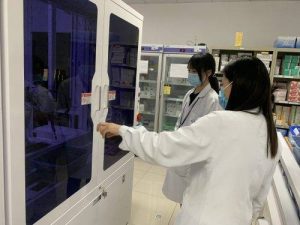
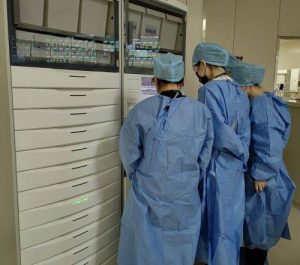
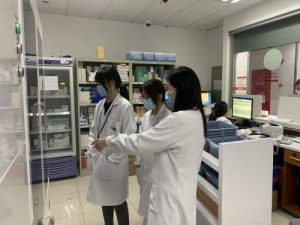
Inpatient Pharmacy Department
In the Inpatient Pharmacy Department, students have reviewed and verified medication orders for accuracy, appropriateness, and potential drug interactions. Also, they need to prepare and dispense medications, including intravenous (IV) admixtures, oral medications, and other formulations. Some pharmacists are involved in compounding commercially unavailable medications or need to be tailored to specific patient needs. While in the Emergency Pharmacy Department, observations reveal that fewer patients are queuing to receive medications than in other departments, such as the Outpatient Department.
This hospital, including the Emergency Pharmacy Department, employs advanced technology to manage various tasks efficiently. For instance, patients scan their QR codes to verify their identities, and baskets filled with their medications—dispensed and organised by advanced machinery—light up to indicate the correct patient.
This technological integration reduces human error, increases efficiency, and minimises processing time, resulting in the need for fewer staff members.
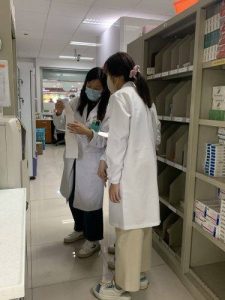
Additionally, during a briefing by a pharmacist, students learned that most medications in this department are in liquid form, administered either orally or intravenously, to ensure rapid onset of action when administered to the patient.
Operating Room Pharmacy
While in the hospital’s west side branch, they also focused on the Operating Room (OR) Pharmacy. This was followed by discovering the critical role of ensuring necessary medications, such as anaesthesia, are available during surgeries. They were particularly intrigued by the automated vending machine system, which streamlines the process of obtaining drugs and minimises human error by dispensing exact dosages. Students also learned about the protocols for restocking and maintaining these machines.
These two weeks offered them a broad perspective on hospital operations, highlighting meticulous oncology care and the technological advancements in different hospital pharmacy departments.
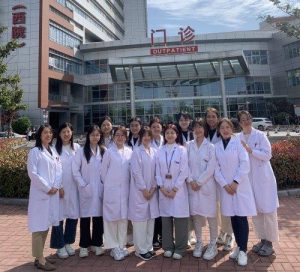
After completing the whole programme in Shanghai, China, all 15 students were honored with certificates presented by the President of Fudan University. The students expressed their reflections on the experience, shared the knowledge they gained during this period, and conveyed deep gratitude to Fudan University for providing this opportunity for exchange. These experiences acquired through this placement are believed to become an unforgettable memory for all students and will serve as a driving force for their future success.
Students’ experience at Fudan University-affiliated Zhongshan Hospital:
An Unforgettable Journey: IMU Pharmacy Students’ Elective Posting Experience at Fudan University-affiliated Zhongshan Hospital
Participants
Lim Siang Han
Chan Cheng Ying
Sean Yap Wen Xuan
Wong Wei Chyi
Law Kah Xin
Gan Hui Xuen
Christy Yong Yee Ung
Khoo Xin Yee
Venus Lee Sing Yee
Aimee Ng Mei Li
Chong Jia Yi
Christina Lee Ying Ying
Gan Sin Yee
Eunice Lim Yu Xuan
Yap Rou Xin



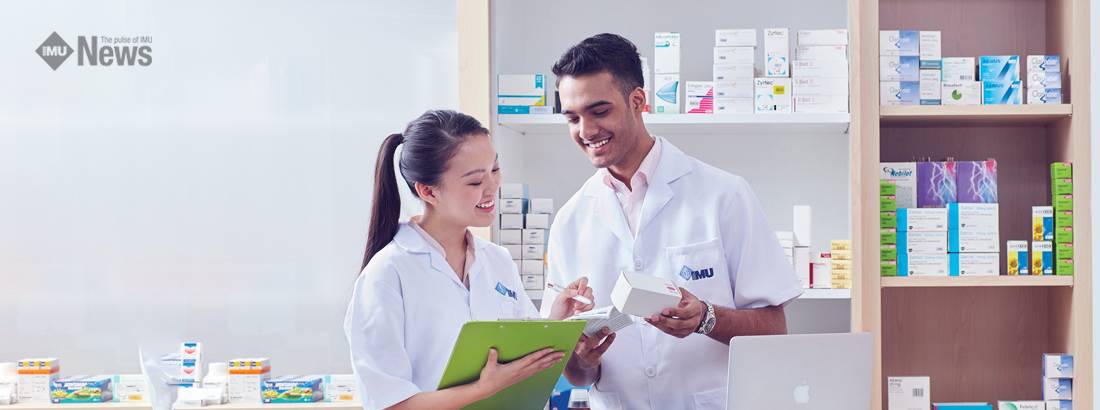
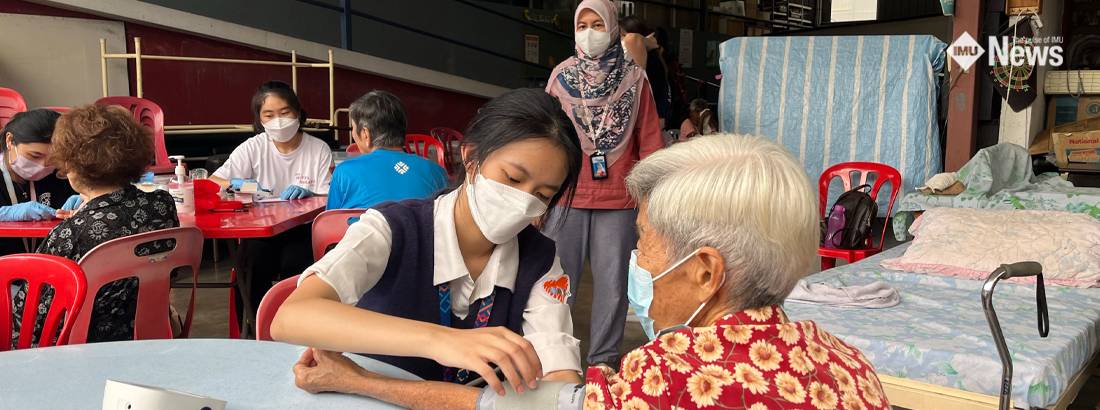
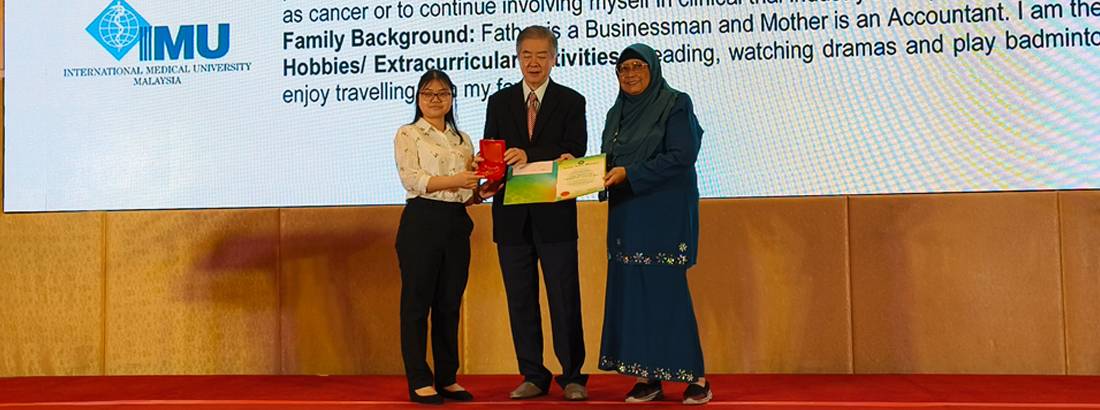
No approved comments.